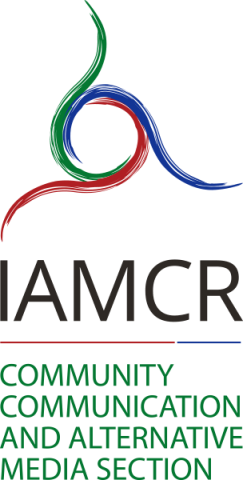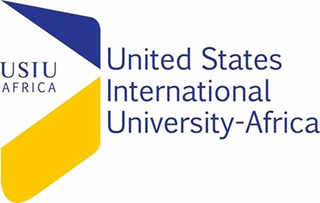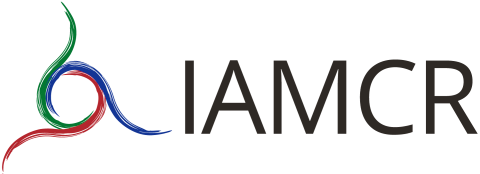Community Communication and Alternative Media Section - Call for Proposals 2021
Ver convocatoria en español abajo
The Community Communication and Alternative Media (CAM) Section of the International Association for Media and Communication Research (IAMCR) invites the submission of proposals for single papers and multi-paper sessions (the online conference equivalent of a panel in a face to face conference) for IAMCR 2021, which will be held online from 11 to 15 July, 2021. The conference will also have a regional hub in Nairobi, Kenya. Both the online conference and the regional hub will be hosted by the Department of Journalism & Corporate Communication of United States International University-Africa (USIU-Africa) in Nairobi. The deadline for submission is 9 February 2021, at 23.59 UTC.
See the IAMCR 2021 general call for proposals
Themes
IAMCR conferences address a wide diversity of themes defined by our 33 thematic sections and working groups. We also propose a single central theme to be explored throughout the conference with the aim of generating and exploring multiple perspectives. This theme is addressed in plenary and special sessions, and in some sessions of the sections and working groups. Not all submissions have to address this central theme.
The central theme for IAMCR 2021, Rethinking borders and boundaries: Beyond the global/local dichotomy in communication studies, is concerned with how changes in communication theory and practice are challenging our understanding of global and local, creating new identities and discourses, and enabling a hybrid glocalisation, with both positive and negative consequences.
Five sub-themes of this central theme have been identified: The rebirth of populist discourses; Activism and the new global social justice movements; Trends in global media ecosystems; Identity: Gender, class, ethnicity, religion, sexuality; and Communication for development in health, climate change and education. See the complete theme description and rationale here.
Conference model: Online with an African "hub" and global satellite activities
In alignment with the possibilities offered by the COVID-19 pandemic, and with the conference’s main theme, Rethinking Borders and Boundaries, IAMCR 2021’s conference will offer multiple modalities for participation. It will be primarily an online conference but will also have an African “hub” at USIU-Africa, and satellite activities at various points around the globe.The various components of the conference include:
1. Online Conference Papers – Abstracts submitted in response to the section and working groups CfPs will be reviewed by the sections and working groups and accepted authors will be invited to submit short conference papers (1,000 to 4,000 words). These papers will be grouped into sessions and published on the conference website prior to the conference on a platform that will enable discussion the conference.
2. Section and Working Group Online Sessions – IAMCR sections and working groups will curate a number of video sessions highlighting key issues within their thematic areas of specialisation.
3. Flow34 – A stream featuring videos that integrate academic and aesthetic narratives. Proposals for this component will be reviewed by the Flow34 team. Topics can originate from the entire field of Communication and Media Studies. The selected videos will be scheduled and presented on the conference platform.
4. Plenary Sessions – Several plenary sessions streamed from the conference hub at USIU-Africa will feature contributions from around the globe.
5. Special and Partner Sessions – These video sessions will be produced by IAMCR and its partners.
6. Nairobi Hub – In addition to being at the centre of the global online activities, the conference hub, at USIU-Africa, will host a regional face-to-face event (in accordance with the possibilities afforded by the pandemic). The regional event will interact with the global at several moments of the conference.
7. Other Regional/National Hubs – We are currently considering the involvement of other regional and national hubs and will be accepting requests from IAMCR members interested in sponsoring them.
This call for proposals is for the Online Conference Papers.
IAMCR members will have full access to all online components.
The Community Communication and Alternative Media Section (CAM) brings together research on community, alternative and citizens’ media and communication forms, media and digital activism, and other forms of civil society-based communication. It considers a wide range of non-governmental and non-commercial communication practices such as do-it-yourself media; media by, for and with geographical communities & communities of interest; indigenous/First Nations media; social movements’ communication; digital resistance and social media protests; counter-cultural and culture jamming expressions; media surveillance & watchdogs; and participatory communication and media that form a ‘third sector’ distinct from public service and commercial media. Such practices may use a variety of communication technologies and forms, from print newsletters to mobile phones, from group communication or demonstrations to community radio and (online) social networks.
The section asks questions such as:
- How do marginalized or vulnerable groups develop, adapt, use and appropriate media and communication technologies?
- What makes citizen media and communication forms effective and sustainable?
- What are the innovative forms of media activism? Are the older forms still alive and useful?
- What are the social, economic, legal and political contexts of community and alternative media?
- What are the most fruitful theories and research methods for studying these media and communication forms?
- Which kind of journalism do they practice? What are the links between journalism and activism?
- Do these media and communication expressions point us to new forms of networked publics, participatory democracy, and active citizenship? Are these concepts problematic?
- What do we learn from citizen & community media? How do we integrate community communication in the Higher education curriculum? Community engagement is central to our work: how does the neoliberal context challenge or constrain scholarship in our area?
- How do alternative and citizen communication projects speak to the global & ecological crises that we face?
- How does community communication understand interculturality and create connections with communities in mobility: migrants, refugees, diasporas, etc.?
The section welcomes current research conducted with grassroots and systemically marginalized communities and social justice movements. CAM is a large, diverse, open and friendly section. We are committed to the discussion of current practices and challenges facing social justice communications, the development of appropriate research approaches that can be useful for grassroots communities and social and environmental justice movements.
Community Communication and Alternative Media focus areas, IAMCR 2021
The Community Communication and Alternative Media Section welcomes contributions from all scholars who research and work in this field and is particularly interested in submissions on the following themes:
- Communication and media strategies to face interculturality & construct bridges between geographic and cultural boundaries
- Indigenous/First Nations communications, and Communication practices from/by/with migrant/refugee communities
- Community across time: Memory, language & archival community resources
- Alternative media and communication to embrace cultural diversity, biodiversity and the response to climate change
- Subaltern journalism practices, citizens’ journalism and challenges to journalism in an era of fake news and social media
- Communication, Media & Tech Activism: practices, processes, outcomes and challenges
- Media Justice / Data Justice
- Methodological frameworks and theoretical approaches to work with and research about community communication and alternative media
- Community Radio and Television / Podcasting and Streaming cultures and practices
- South to South exchanges and dialogues in relation to community communication and alternative media
Guidelines for abstracts
Abstracts submitted to the Community Communication and Alternative Media Section should have between 300 and 500 words and must be submitted online via IAMCR's online submission platform. Abstracts submitted by email will not be accepted.
It is expected that authors will submit only one (1) abstract. However, under no circumstances should there be more than two (2) abstracts bearing the name of the same author, either individually or as first author. No more than one (1) abstract can be submitted by an author to the Community Communication and Alternative Media Section. Please note also that the same abstract or another version with minor variations in title or content must not be submitted to more than one section or working group. Any such submissions will be deemed to be in breach of the conference guidelines and will be rejected.
Proposals are accepted for both single papers and multi-paper sessions (the online conference equivalent of a panel in a face to face conference). Please note that there are special procedures for submitting multi-paper sessions. You can find the detailed procedures when submitting your abstract online in the abstract submission system.
If your abstract is accepted, you will need to submit your full conference paper (1,000 to 4,000 words) by 7 June 2021, in order to be included in the programme.
Languages
This Section accepts abstract submissions in all the three official languages of IAMCR: English, French and Spanish. You can submit the abstract and the full paper (if accepted) in any of these three languages. Papers will be organized in groups according to the themes they have in common, and these will be multi-lingual.
In line with the section’s existing practice of facilitating ‘whisper translation’ of sessions where possible, we will make every effort to provide some form of informal translation support in online sessions in 2021.
The deadline to submit abstracts is 9 February 2021 at 23h59 UTC.
See important dates and deadlines to keep in mind
For further information about the conference contact nairobi2021 [at] iamcr.org
For further information about the Community Communication and Alternative Media Section, its themes, submissions and multi-paper sessions please contact:
Co-Chair: Amparo Cadavid (School of Communication, UNIMINUTO, Colombia): amparo.cadavid [at] consultingecho.com
Co-Chair: Vinod Pavarala (UNESCO Chair on Community Media / University of Hyderabad, India): vpavarala [at] gmail.com
Vice chair: Alejandro Barranquero (Universidad Carlos III de Madrid, Spain): abarranq [at] hum.uc3m.es
Vice chair: Andrew Ó Baoill (School of English and Creative Arts, National University of Ireland Galway): andrew.obaoill [at] nuigalway.ie
Sección Comunicación Comunitaria y Medios Alternativos - Convocatoria de resúmenes 2021
La sección Comunicación Comunitaria y Medios Alternativos (CAM) agrupa investigaciones sobre medios y formas de comunicación comunitarias, alternativas y ciudadanas, activismo mediático y digital, y otras formas de comunicación de la sociedad civil. La sección examina una amplia gama de prácticas de comunicación no gubernamentales y no comerciales, como los medios de comunicación DIY, medios y comunicación por, para y con comunidades geográficas y de interés; medios de comunicación indígenas y de pueblos originarios; la comunicación en los movimientos sociales; resistencia digital y protestas en redes tecnológicas; expresiones contraculturales y de interferencia cultural; vigilancia de los medios de comunicación; la comunicación participativa y sus medios que conforman un "tercer sector" distinto de los medios de comunicación comerciales y de servicio público. Esas prácticas utilizan diversas tecnologías y formas de comunicación, desde boletines impresos hasta teléfonos móviles o celulares, desde comunicaciones grupales o manifestaciones hasta radios comunitarias y redes sociales (digitales).
En la sección se plantean preguntas como las siguientes:
- ¿Cómo desarrollan, adaptan, utilizan y se apropian los grupos marginados o vulnerables los medios y tecnologías de la comunicación a su alcance?
- ¿Qué fórmulas existen para hacer de estos medios formas eficaces y sostenibles de comunicación?
- ¿Cuáles son los formatos innovadores del activismo mediático? ¿Están aún vivas formas antiguas?
- ¿Cuáles son los contextos sociales, económicos, legales y políticos de los medios comunitarios y alternativos?
- ¿Qué teorías y métodos de investigación son los más fructíferos para estudiar estos medios y formas de comunicación?
- ¿Qué tipo de periodismo practican? ¿Cuáles son los vínculos entre el periodismo y el activismo?
- Estos medios y expresiones comunicacionales, ¿nos conducen a nuevas formas de públicos en red, democracia participativa y ciudadanía activa? ¿Son estos conceptos problemáticos?
- ¿Qué aprendemos de los medios ciudadanos y comunitarios? ¿Cómo integramos la comunicación comunitaria en los programas de estudio de la enseñanza superior? Si la participación comunitaria es fundamental para nuestro trabajo, ¿cómo desafía o limita el contexto neoliberal las prácticas académicas en nuestro campo?
- ¿Cómo interpelan los proyectos de comunicación alternativa y ciudadana a las crisis mundiales y ambientales a las que nos enfrentamos?
- ¿Cómo entiende la comunicación comunitaria la interculturalidad y crea conexiones con las comunidades en movilidad: migrantes, refugiados, diásporas, etc.?
La sección acoge con beneplácito las investigaciones actuales realizadas con comunidades de base y marginadas sistemáticamente y con movimientos de justicia social. CAM es una sección amplia, diversa, abierta y amigable. Estamos comprometidos con la discusión de las prácticas actuales y los desafíos que enfrenta la comunicación frente a la justicia social, el desarrollo de enfoques de investigación apropiados, útiles para las comunidades de base y los movimientos de justicia social y ambiental.
Áreas de trabajo de la Sección Comunicación Comunitaria y Medios Alternativos, IAMCR 2021
La Sección de Comunicación Comunitaria y Medios Alternativos agradece las contribuciones de toda persona interesada en la investigación y el trabajo en este campo y está particularmente interesada en trabajos sobre los siguientes temas:
- Estrategias de comunicación y medios para enfrentar la interculturalidad y construir puentes entre las fronteras geográficas y culturales
- Comunicación en las comunidades indígenas y pueblos originarios y prácticas de comunicación de/por/con comunidades de migrantes/refugiados
- Comunidad y temporalidad: Memoria, lenguaje, recursos y prácticas de archivo de tipo comunitario
- Medios y comunicación alternativa para la gestión de la diversidad cultural, la biodiversidad y las respuestas al cambio climático
- Prácticas periodísticas subalternas, periodismo ciudadano y desafíos del periodismo en una era de noticias falsas y medios sociales
- Activismo comunicacional, mediático y tecnológico: prácticas, procesos, resultados y desafíos
- Justicia mediática / Justicia de datos
- Marcos metodológicos y enfoques teóricos para trabajar e investigar sobre la comunicación comunitaria y los medios alternativos
- Radio y televisión comunitaria / Culturas y prácticas de podcasting y streaming
- Intercambios y diálogos Sur a Sur en relación con la comunicación comunitaria y los medios alternativos
Guía para los Resúmenes
Los resúmenes remitidos a la Sección de Comunicación Comunitaria y Medios Alternativos deben tener entre 300 y 500 palabras y deben ser remitidos online a través de la plataforma de remisión de IAMCR. Los resúmenes remitidos por email no serán aceptados.
Se espera que los autores presenten solo un (1) resumen. En cualquier caso, un/a autor no puede presentar más de dos (2) resúmenes, ya sea individualmente o como primer autor/a. Un/a autor/a no podrá presentar más de un (1) resumen a la Sección de Comunicación Comunitaria y Medios Alternativos. Tenga en cuenta que el mismo resumen u otra versión con pequeñas variaciones en el título o el contenido no debe ser presentado a más de una sección o grupo de trabajo. Cualquier presentación de este tipo se considerará como una violación de las directrices de la conferencia y será rechazada.
Se aceptan propuestas tanto para ponencias individuales como para sesiones multi-articulo (el equivalente online a un panel de una conferencia cara a cara). Tenga en cuenta que existen procedimientos especiales para la presentación de propuestas de sesiones multi-articulo.
Si su resumen es aceptado, deberá enviar su artículo completo (1,000 a 4,000 palabras) antes del 7 de junio de 2021, para ser incluido en el programa.
Idiomas
Esta sección acepta resúmenes y artículos completos en los tres idiomas oficiales de la AIERI: inglés, francés y español. Puede enviar el resumen y el artículo completo (si es aceptado) en cualquiera de estos tres idiomas. Los articulos completos se organizarán en grupos de acuerdo con las continuidades entre los temas, y las éstos serán multilingües.
Para más información acerca de la Sección de Comunicación Comunitaria y Medios Alternativos, sus temas, envíos, sesiones multi-articulo, etc., contacte por favor con:
Co-Chair: Amparo Cadavid (School of Communication, UNIMINUTO, Colombia): amparo.cadavid [at] consultingecho.com
Co-Chair: Vinod Pavarala (UNESCO Chair on Community Media / University of Hyderabad, India): vpavarala [at] gmail.com
Vice chair: Alejandro Barranquero (Universidad Carlos III de Madrid, Spain): abarranq [at] hum.uc3m.es
Vice chair: Andrew Ó Baoill (School of English and Creative Arts, National University of Ireland Galway): andrew.obaoill [at] nuigalway.ie


